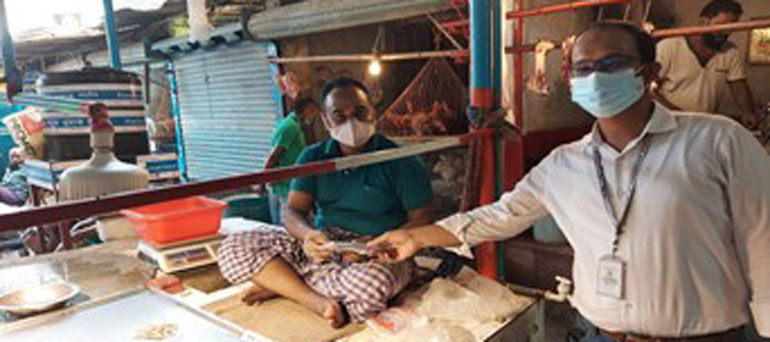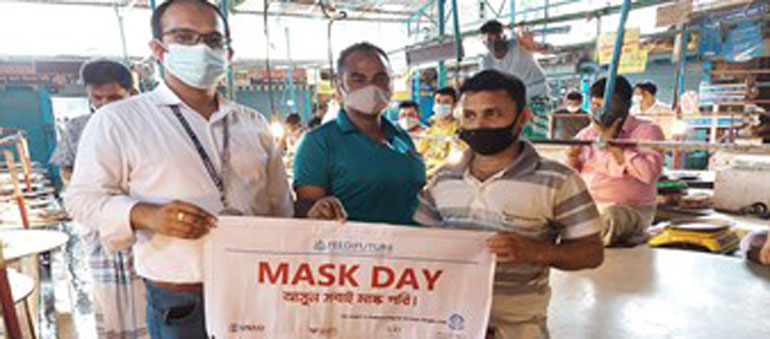Visiting a traditional ‘wet market’ in Dhaka, Bangladesh is a sensory experience full of colour, aroma, and the buzz of neighbourhood voices. Round platters full of fresh meat, fish, produce, and other perishable goods at markets have, for generations, provided nutritious and affordable food sources while supporting local livelihoods. Fresh-food markets are more than what they sell; they contribute to a sense of community as well as trust among consumers and vendors.
COVID-19 presents challenges and opportunities for the ways in which traditional markets can continue to provide vital local food products while also improving measures of food safety, hygiene, and infrastructure that protect consumers and workers. At the start of the pandemic, the Global Alliance for Improved Nutrition (GAIN) quickly adjusted its programmes on the ground in Bangladesh to ensure that life-saving COVID-19 restrictions did not in turn increase life-threatening food and nutrition insecurity. Its emergency response programme Keeping Food Markets Working (KFMW) provides rapid support to food system workers, small and medium enterprises, and fresh food markets—creating a lifeline for local nutritious food sources that build strong immune systems and long-term health.
Here are the stories of three individuals—a market vendor, a local government official, and a neighbourhood consumer - whose collective knowledge, support, and feedback have helped GAIN and its partners keep Dhaka’s Islambagh City Corporation Wet Market open and safe.
A Fish Vendor’s Commitment
At the Islambagh City Corporation Wet Market, many shoppers know Nizam Uddin by name. A fish vendor living in Old Dhaka with his wife and two children, Nizam arrived in the capital 25 years ago from Shariyatpur district in search of a better livelihood. After trying his hand at a series of small enterprises, he began a fish business at the wet market in 2000.
Nizam has cultivated a trusted reputation among his clients for selling safe and high-quality fish, though his interest in food and market safety does not end with his workday. He has become a member of the Islambagh City Corporation Wet Market Committee, and, at the height of the pandemic, joined the market’s COVID-19 response team.

Nizam has cultivated a trusted reputation among his clients for selling safe and high-quality fish, though his interest in food and market safety does not end with his workday. © GAIN
When GAIN and its partners brought its emergency KFMW programme to Islambagh in August 2020 as part of the organisation’s food markets workstream, Nizam offered his help and participation across all of the project activities. These activities, involving initial data collection from complementary GAIN projects such as EatSafe with market infrastructure interventions and improvements by KFMW, develop guidance alongside and for market administrators, consumers, and vendors like Nizam, who are working together to keep the markets safe and ‘smart’ during this critical period.
After a series of pandemic lockdowns that depleted vendors’ incomes, rocked food prices, and created public confusion over whether and how to attend markets, news has spread quickly about the safety materials provided to vendors and consumers through the KFMW Programme efforts. Using GAIN’s adaptable COVID-19 safety communications toolkits, Islambagh City Corporation Wet Market is equipped with posters, leaflets, digital signboards, and audio aids such as PA system announcements and jingles. In addition to these public reminders, the market’s physical infrastructure is undergoing safety improvements.
Nizam says that, before starting with the KFMW project, he and the other vendors did not always have a clear idea about how best to keep the market clean and healthy through the proper transport and storage of their fish supplies, nor what to do to stay safe from COVID-19. After participating in project meetings and trainings, however, he acquired comprehensive information on how to protect himself, his consumers, and overall business from the impact of COVID-19 while improving sanitary and food safety practices.

Using GAIN’s adaptable COVID-19 safety communications toolkits, Islambagh City Corporation Wet Market is equipped with posters, leaflets, digital signboards, and audio aids such as PA system announcements and jingles. © GAIN
"Now I keep my shop clean and tidy, use a face mask regularly, and sanitize my hands frequently," Nizam said. "I urge the vendors, consumers, and family members to observe these things." While Nizam said that he and his family had often gotten sick in the past due to the sheer number of people a market fish vendor serves, lately they have been staying healthy with the help of the market’s new sanitary measures. He also sees improvement in the health of his business: "An increased number of consumers are coming into the market because of the use of face masks among the vendors."
Previously in the market, Nizam said, "water always got stuck [on the ground] due to an improper drainage system. As a result, a dirty and damp atmosphere prevailed in the market. Now our market environment has become very beautiful through the renovations initiated by GAIN Bangladesh."
"I am grateful to GAIN Bangladesh because they have made these changes in our market. Our request to GAIN is that they must continue this program to advance the overall development of the wet market."
Without the business sense, committee interest, and project participation of Nizam and vendors like him, this work toward "Keeping Food Markets Working" would not be possible. Through his presence in GAIN-organised programmes and trainings, Nizam has mutually aided GAIN’s ability to better understand the market’s infrastructure and needs. His trusted, integrated relationships among clients, fellow vendors, and market administrators is helping to ensure that this crucial work endures the length of the pandemic and enjoys results far beyond it.